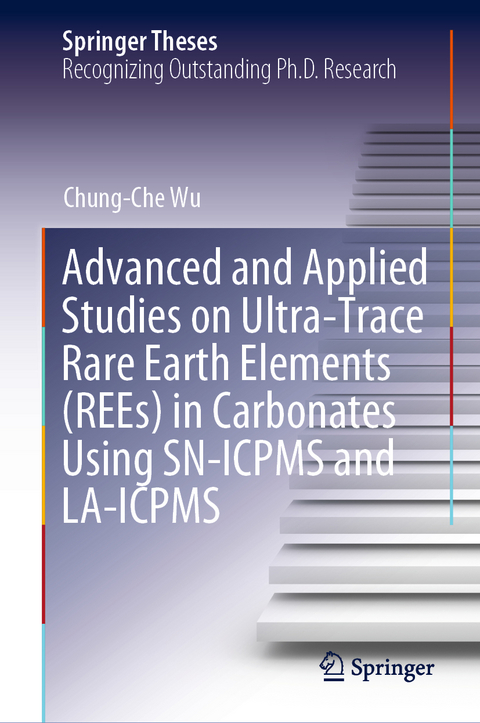
Advanced and Applied Studies on Ultra-Trace Rare Earth Elements (REEs) in Carbonates Using SN-ICPMS and LA-ICPMS
Springer Verlag, Singapore
978-981-16-3618-9 (ISBN)
In the first SN-ICPMS protocol, direct measurements for femtogram quantity carbonate samples without chemical separation steps can offer accurate and high-precision analysis (±1.9-6.5%, 2σ) with a high sample throughput of 8-10 samples/hr routinely. Application to modern Porites corals collected from South China Sea region, the anomalies of REE contents and Al/Ca ratios associated with micro-domain images, register modern coral reefs could be exacerbated by volcanic eruptions.
In the second protocol, a high-sensitivity quantitative open-cell LA-ICPMS technique has been established to allow direct sampling on stalagmite surface in the atmospheric air. This technique improved limits of detection down to sub-ng/g range and promises analyses of carbonate REE profiles at the single digit parts-per-billion (ppb) levels. Application to a 15-cm stalagmite collected from East Timor reveals two peaks of REE contents by at least one order of magnitude, possibly due to volcanic ash preserved in stalagmite.
Both improved SN-ICPMS and LA-ICPMS techniques highlight the high-sensitivity and high-temporal-resolution carbonate REE analyses for corals and stalagmites, with great potential to other natural carbonates such as travertine, tufa, and flowstone, benefit our understanding of paleoclimatic and paleoenvironmental dynamics.
Dr. Chung-Che Wu works at National Taiwan University. His research interest is developing analytical techniques for topics in paleoclimate and paleo-environment change.
Introduction.- Approach I: Direct determination of carbonate REES in femtogram quantities by solution nebulization-inductively coupled plasma mass spectrometry(SN-ICPMS).- Application I: Pinatubo volcanic eruption exacerbated an abrupt coral mortality event in 1991 summer.- Approach II: Highly-sensitive open-cell laser ablation-inductively coupled plasma mass spectrometry(LA-ICPMS) approaches for the quantification of rare earth elements in carbonates at parts-per-billion levels.- Application II: Stalagmite-based micro-domain tephra fingerprints in East Timor between 88 to 78 ka BP.- Summary and perspective.
| Erscheinungsdatum | 16.08.2021 |
|---|---|
| Reihe/Serie | Springer Theses |
| Zusatzinfo | 16 Illustrations, color; 6 Illustrations, black and white; XV, 64 p. 22 illus., 16 illus. in color. |
| Verlagsort | Singapore |
| Sprache | englisch |
| Maße | 155 x 235 mm |
| Themenwelt | Naturwissenschaften ► Biologie ► Ökologie / Naturschutz |
| Naturwissenschaften ► Chemie ► Technische Chemie | |
| Naturwissenschaften ► Geowissenschaften ► Geologie | |
| Naturwissenschaften ► Geowissenschaften ► Meteorologie / Klimatologie | |
| ISBN-10 | 981-16-3618-4 / 9811636184 |
| ISBN-13 | 978-981-16-3618-9 / 9789811636189 |
| Zustand | Neuware |
| Informationen gemäß Produktsicherheitsverordnung (GPSR) | |
| Haben Sie eine Frage zum Produkt? |
aus dem Bereich


